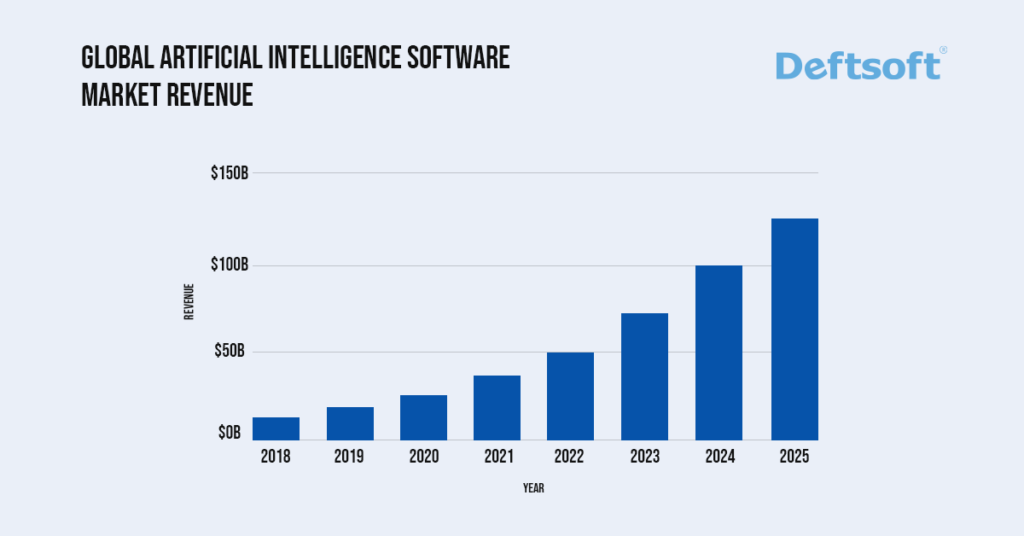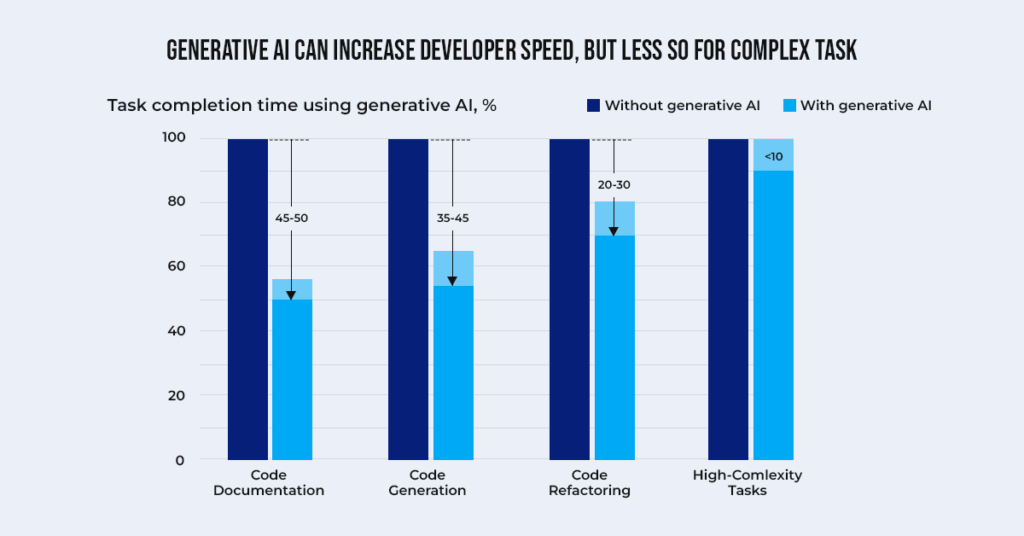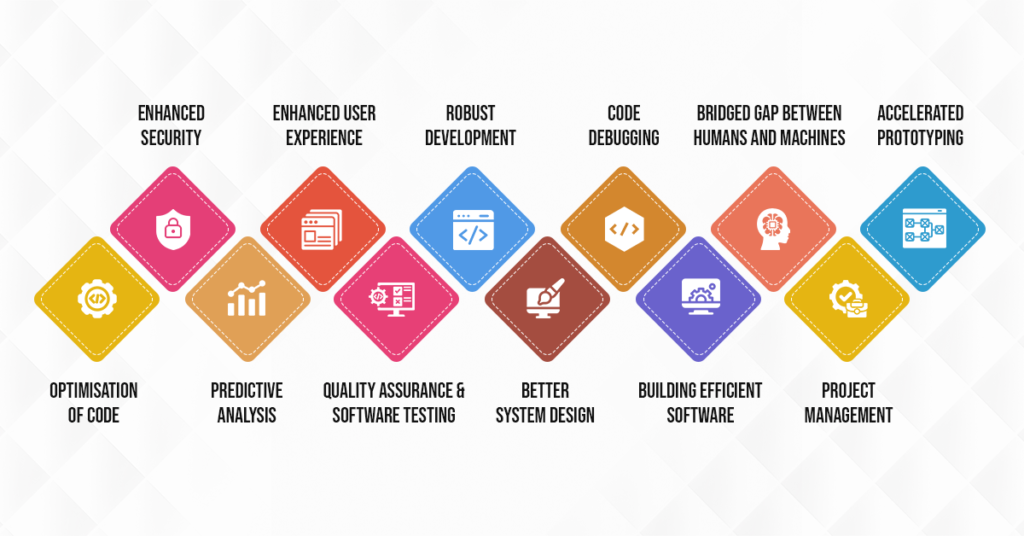
Why Should You Deploy AI in Software Development?
-
By Paramjit Singh
-
5th February 2024
Artificial Intelligence (AI) is considered a threat to tons of technical and creative jobs today. People are restraining themselves from technical roles, such as Software Developers, Engineers, etc., for fear of losing their careers in the near future.
According to a Forbes Advisor survey, approximately 64% of business organizations believe that Artificial Intelligence (AI) will help boost their overall efficiency. This statistic is a massive indicator of innate confidence in AI’s ability to transform business operations and functionality. The global Artificial Intelligence Software market revenue will reach $126 billion by 2025!

Thanks to the power of Artificial Intelligence (AI), it can rev up the process of performing tedious software development tasks by automating them, making software deployments more efficient, aids in consisting the code, and helps in migrating from one API or framework to another with ease.
Since AI in software development plays a pivotal role in shaping the industry, discussing how AI helps in software development is non-negotiable. This blog is the perfect source of information for software developers and other technical individuals seeking to understand AI’s impact on the industry.
Let’s begin discussing how to apply AI in software development without further ado.
Real-Life Use Cases of Artificial Intelligence (AI) in Software Development
I’m jazzed, in particular, about the potential for AI to take away those more mundane activities and to make it so that we can all focus on the fun part of the job, which is asking questions, creating things, and then using code to solve problems.
Paige Bailey, Product Lead for Generative AI Models at Google
AI has taken the world by storm because of its unfathomable efficiencies and the ability to help tech people focus on the creative part of the job, thus positively contributing to the productivity cycle of the job. One can unlock the power of AI in performing a broad spectrum of technical tasks as a software developer.
Some of the real-life use cases of Artificial Intelligence (AI) in software development are as follows:
- Code snippet generation:
One of the most relevant and impeccable applications of AI in software development is harnessing the power of AI-backed tools for writing code snippets or even comprehending a snippet of code that is difficult to understand. One such AI-powered tool is Open AI’s Co-Pilot. It is a valuable tool for programmers and software developers as it helps generate code snippets and complete single-line and multi-line codes.
Therefore, the process becomes much more efficient and productive when a software developer authorizes code.
- Code review:
According to a recent study by McKinsey, software developers can complete coding tasks twice as fast with Generative AI.

As evident from the above image, there is a significant reduction in completing coding tasks by harnessing the power of AI.
The integration of machine learning models in the code review process has become quite significant. Imagine this: if some reviewer requests a change in code in a business organization, the AI tools can automatically help generate code to help make the changes. Therefore, it has become easier to support software developers in their everyday job of developing, sharing, and completing code, identifying bugs, etc.
- Cutting down organizational costs:
With the help of Artificial Intelligence, a software developer can identify bits of code that aren’t as efficient as they seem to be. This process further helps save a lot of money since these code redundancies can be identified on a small scale, thus preventing them from being applied on a larger scale in a business organization or enterprise.
For instance, if you’re a software developer in a colossal enterprise, identifying even one small change can impact the dynamics of up-and-running data centers. This process of recognizing code shortcomings can help save the power of thousands of data centers’ Graphic Processing Units (GPUs). Leveraging AI in software development helps reduce surplus costs and saves millions and billions of dollars.
How AI Aids in Software Development?
Now that we’ve discussed the real-life use cases of AI in software development, it’s time to discuss why to use AI in software development. The following are some of the most noteworthy ways of why to use AI in software development:

1. Optimization of code:
By utilizing the power of AI algorithms, one can analyze codebases and identify where there is scope for code optimization. A software developer can create robust and more efficient software solutions by suggesting improvements in code and significant ways to optimize source code.
For instance, a software developer can utilize the ‘code support’ feature when using Bard. You can then generate natural language and source code with syntax highlighting, which can be further exported into Google Colab Notebook or any other developer services. On top of that, Bard also helps in debugging the code.
2. Enhanced security:
The use of AI can help in identifying vulnerabilities in software systems. Therefore, it can help suggest improvements to generate more secure codes, including cross-site scripting, SQL injection, etc.
For example, AI can recognize and patch vulnerabilities in systems and software that help prevent future cyber attacks or any other malicious attack. AI algorithms also offer software solutions for improved security.
3. Predictive analysis:
Data-driven development is part and parcel of software development at present. Making informed decisions is crucial for any business organization; however, it is time-consuming for a human to analyze vast amounts of data alone. AI can help optimize processes, identify potential risks and vulnerabilities, and make data-driven decisions.
The AI uses machine learning algorithms and statistical models to forecast events and identify software vulnerabilities, thus saving much money.
4. Enhanced user experience:
Software developers can leverage the potency of Artificial Intelligence by increasing user personalization of software and further transforming the user experience. One can use AI to recommend customized and tailor-made content to the user.
5. Quality assurance and software testing:
Artificial Intelligence also plays a critical role in software testing and quality assurance. It can generate test cases automatically, execute tests based on different scenarios, and even analyze results in real-time. These AI-backed software testing tools share various levels of autonomy, ranging from integrated automation testing to autonomous testing.
For example, Mabl is one of the best and the mightiest AI-powered testing tools. It allows low-code testing as the script does not need to use this tool. Since it provides robust testing throughout the software development process for large teams, it is an excellent tool for busy teams.
6. Robust development:
Many software development processes can be streamlined with the use of machine learning and deep learning methodologies. It would eliminate the need for manual testing as it has the power to test software at every stage. AI has especially helped DevOps teams speed up the software development process and bridge the gap between software development and operation processes teams.
7. Better system design:
Artificial Intelligence has a beautiful application in architecting system design. For example, AI can be used to predict real-time results when new requirements are incorporated into a system. This application of AI helps enterprises and business organizations gauge the spending on system design and keep track of their monthly budget.
Companies can leverage the power of AI in recommendation engines, chatbots, etc., to enhance the functioning of systems and software in general.
8. Code debugging:
One of the most powerful uses of AI in software development is debugging codes. Apart from fixing bugs in the code at high speed, it can also fix potential issues, thus improving the quality of the software.
Software developers can save significant time by using AI for troubleshooting code and debugging. For instance, Rookout is an excellent tool with real-time debugging capabilities. Similarly, Undo is an intelligent AI tool that offers a sophisticated user interface and capabilities to debug codes as a software developer.
9. Building efficient software:
The role of AI in software development has now become indispensable. Software can become less resource-intensive, more efficient, productive, and quick to fix bugs by integrating AI into software and systems. AI has also been significant in fortifying software from malicious attacks and building safe code snippets.
For example, Microsoft’s AI-powered tool, “Project InnerEye”, has played a pivotal role in helping doctors cure cancer by analyzing images. Microsoft is deploying this same technology to optimize the performance of the Windows operating system.
10. Bridged the gap between humans and machines:

Software can comprehend, understand, and respond to human language. Thanks to Natural Language Processing (NLP). It plays a critical role in helping machines understand the language of humans and translate it into something that is understandable to machines. One can enhance software’s efficiency, quality, and robustness by using AI-backed Natural Language Processing (NLP).
In fact, a recent study by Accenture claimed that the testing time was reduced by 80% with the help of AI in software development.
11. Project management:
Leveraging Artificial Intelligence in project management provides valuable and actionable insights for the process of application development. A lot of routine work can be automated with the help of AI, including setting up meetings, managing milestones and goals, allocating projects, and delegating a diverse range of tasks.
12. Accelerated prototyping:
Software developers can explore the capabilities of AI in software development through AI-backed automated code generation. This practice rapidly helps prototyping because of the robust iterations and various refinements. Thanks to AI, business organization teams can collaborate more efficiently over projects, identify bugs and errors early in the codes, reduce time-to-market, and explore a broad spectrum of design capabilities.
In a Nutshell
Artificial Intelligence is an ocean of various technologies and new-generation techniques. While the world is exploring this ocean of infinite opportunities, applications, and advantages, it is trickling down in the software development industry. Software developers, engineers, administrators, and technicians are maximizing their professional efforts by leveraging the strength and capabilities of AI in software development.
From finding bugs in codes to enhancing the speed of software testing, the software development industry is fostering the unparalleled contributions of AI. After all, AI is not here to replace the jobs of software developers but to optimize output.
If you’re a business organization or enterprise looking to expand its horizons in the software development industry, now is the best time to unveil the shroud of unlimited possibilities with AI in software development. Deftsoft has a team of industry-experienced software developers who are well-versed in Artificial Intelligence. Get tailor-made solutions with us!
FAQs:
How can AI help in software development?
Software developers can utilize AI in software development by exploring its infinite applications in the industry, such as its ability to identify bugs in codes rapidly, write efficient code, contribute to the optimized functioning of data centers and cloud, accelerate the process of software testing, aid in project management and help DevOps professionals in improved software functionalities and deliveries.
What are the significant impacts of AI on software development?
AI has transformed the software development scenario since it has eliminated various redundancies in the system, ranging from inefficient code to the analysis of complex codebases. This primary functionality of AI has positively impacted the software development industry and made codebases less complicated, more straightforward to comprehend, and more efficient.
Can AI replace software developers in the future?
No, AI cannot replace software developers in the future. The technology is here only to empower and ignite the software development process. In fact, software development has only improved with the integration of AI tools and algorithms.
What are some of the AI tools used in software development?
Some of the most popular AI tools deployed in software development include AppliTools, GitHub CoPilot, Mabl, Tabnine, ChatGPT, etc. All these tools have different functionalities and use cases. For instance, Mabl is a wonderful tool for large-scale software testing for enterprises or busy business organizations. On the other hand, GitHub CoPilot is a code generation tool that helps software developers write multi-line or single-line code.
How to integrate AI into software?
One of the most important steps is to create an overview of the complete AI development lifecycle and make note of the AI Tech Stack, which can help you measure the requirements before beginning with the integration of AI into software.
Should you use AI in software development?
Yes, it is beneficial to use AI in software development. It can help in efficiently writing codes, managing codebases, enhancing the efficiency of software, testing software, and locating bugs in the code. Many AI integration tools can be integrated into the software development process to analyze its efficiency and productivity.
Recent Articles
-

Unity vs Unreal Engine 5: Which is Better?
-

Non-Negotiable Tips for Developing a P2P Lending Platform
-

The 8 Leading Cross-Platform App Development Frameworks You Should Know
-

Step-by-Step Guide: How to Build a dApp on Ethereum with Ease
-

Why Does Your Business Need Blockchain Development Company’s Expertise?

Paramjit Singh
 5th February 2024
5th February 2024